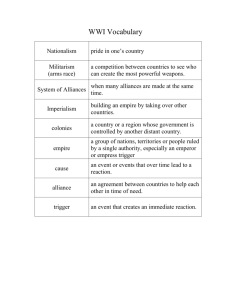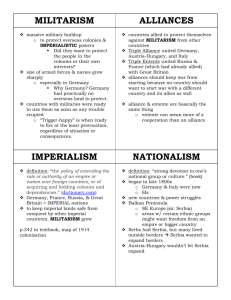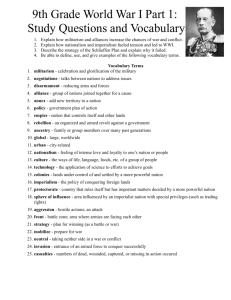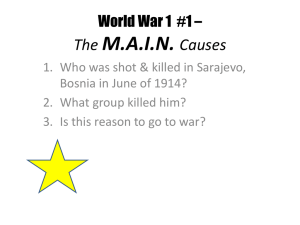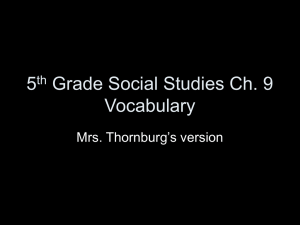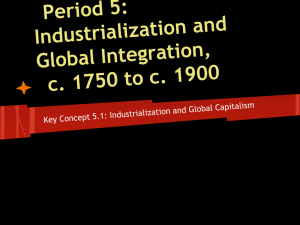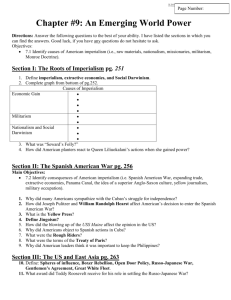historical forces - Burnside High School
advertisement
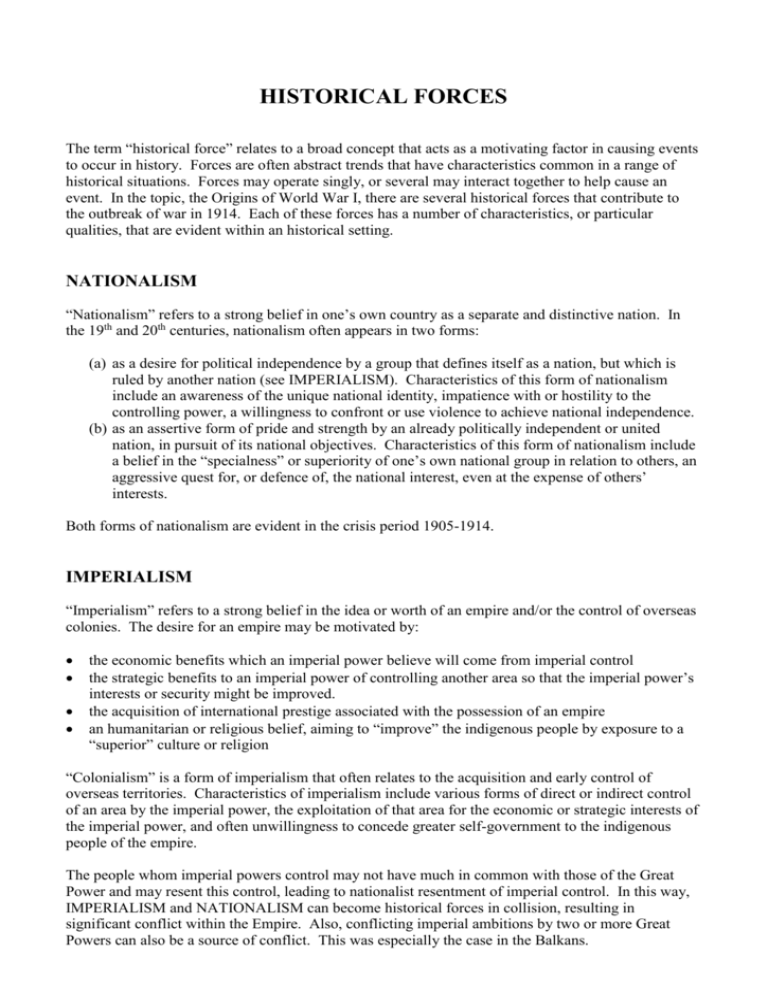
HISTORICAL FORCES The term “historical force” relates to a broad concept that acts as a motivating factor in causing events to occur in history. Forces are often abstract trends that have characteristics common in a range of historical situations. Forces may operate singly, or several may interact together to help cause an event. In the topic, the Origins of World War I, there are several historical forces that contribute to the outbreak of war in 1914. Each of these forces has a number of characteristics, or particular qualities, that are evident within an historical setting. NATIONALISM “Nationalism” refers to a strong belief in one’s own country as a separate and distinctive nation. In the 19th and 20th centuries, nationalism often appears in two forms: (a) as a desire for political independence by a group that defines itself as a nation, but which is ruled by another nation (see IMPERIALISM). Characteristics of this form of nationalism include an awareness of the unique national identity, impatience with or hostility to the controlling power, a willingness to confront or use violence to achieve national independence. (b) as an assertive form of pride and strength by an already politically independent or united nation, in pursuit of its national objectives. Characteristics of this form of nationalism include a belief in the “specialness” or superiority of one’s own national group in relation to others, an aggressive quest for, or defence of, the national interest, even at the expense of others’ interests. Both forms of nationalism are evident in the crisis period 1905-1914. IMPERIALISM “Imperialism” refers to a strong belief in the idea or worth of an empire and/or the control of overseas colonies. The desire for an empire may be motivated by: the economic benefits which an imperial power believe will come from imperial control the strategic benefits to an imperial power of controlling another area so that the imperial power’s interests or security might be improved. the acquisition of international prestige associated with the possession of an empire an humanitarian or religious belief, aiming to “improve” the indigenous people by exposure to a “superior” culture or religion “Colonialism” is a form of imperialism that often relates to the acquisition and early control of overseas territories. Characteristics of imperialism include various forms of direct or indirect control of an area by the imperial power, the exploitation of that area for the economic or strategic interests of the imperial power, and often unwillingness to concede greater self-government to the indigenous people of the empire. The people whom imperial powers control may not have much in common with those of the Great Power and may resent this control, leading to nationalist resentment of imperial control. In this way, IMPERIALISM and NATIONALISM can become historical forces in collision, resulting in significant conflict within the Empire. Also, conflicting imperial ambitions by two or more Great Powers can also be a source of conflict. This was especially the case in the Balkans. MILITARISM “Militarism” refers to a belief in the importance of military power and efficiency as a national or political priority. Characteristics of militarism include increasing the size of a country’s armed forces, spending an increasing proportion of a nation’s annual budget on military matters, a continual desire for military developments, such as new or updated weaponry, and detailed military planning based on fear of other nations’ perceived military strength. Militarism is often linked with aggressive nationalism, as military strength gave nations the confidence to assert their national interests if nations believed they conflicted with other nations’ interests or ambitions. Militarism was sometimes a product of the desire to protect or retain control or a nation’s imperial possessions. Militarism was important prior to World War I as the climate of hostility and fear led to greater levels of military growth and spending, leading to an “arms race” between European powers to become more powerful than their perceived enemies. THE ALLIANCE SYSTEM “The Alliance System’ refers to a complex series of political and military agreements aimed at improving nations’ sense of security by acquiring allies who might support them in case of war. Characteristics of alliances are that they often involve formal agreements that specify how and when an alliance might be activated, that they can be defensive in nature (only operating if a nation was attacked), and may involve significant military cooperation and/or planning. Alliances aimed to provide security to deal with nations’ fears about perceived threat from other nations. Alliances were sometimes linked to MILITARISM, in that nations needed to ability to contribute militarily if the terms of an alliance were activated, and allies often cooperated in military planning and manoeuvres. The irony is that although alliances were supposed to provide security by potential enemies being deterred by the combined strength of a particular alliance, they contributed to insecurity by raising fear and suspicion among nations. Consequently by 1914, Europe was divided into two hostile, armed camps, whose suspicions of each other were fuelled by nationalistic passions and imperial rivalries. CONCLUSION The complex interaction of these historical forces was evidence in many of the crises prior to 1914, and in the final July Crisis which led to the outbreak of the Great War.

